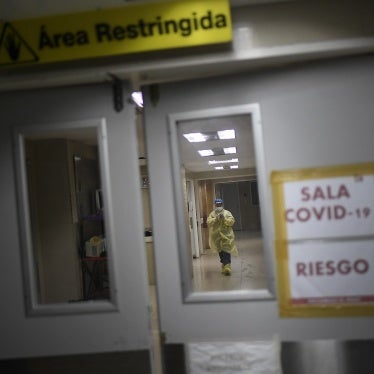Parties to the proposed Free Trade Area of the Americas (FTAA) should reject any agreement that strengthens HIV/AIDS drug patents at the expense of public health measures permitted by existing global trade rules, Human Rights Watch said in a briefing paper released today. FTAA negotiations continue this week with the Seventh Ministerial Meeting in Quito, Ecuador, with the United States taking a leading role in pushing stronger patent protection for medicines.
Drug patenting is currently governed by the World Trade Organization’s (WTO) Trade Related Aspects of Intellectual Property Agreement (TRIPS), which requires WTO member states to grant twenty-year patent protection on all technological innovations, including HIV/AIDS drugs. According to a consensus reached at the Fourth Ministerial Conference of the WTO in Doha, Qatar in November, 2001, TRIPS supports WTO members’ right to promote universal access to essential medicines. For example, TRIPS allows countries to override patents if they pay a reasonable royalty to the patent-holder or declare a national emergency. But the FTAA draft contains numerous restrictions on this practice, depriving states of a crucial means of guaranteeing access to essential HIV/AIDS drugs and fulfilling their international obligations to ensure their populace the highest attainable standard of health.
The U.S. attempts to make the FTAA rules more protective than the WTO are known as “TRIPS-plus” and have sparked opposition from AIDS treatment advocates around the world.
“No one, including the United States, doubts the importance of overriding patents in times of public health emergency,” said Jonathan Cohen, researcher with Human Rights Watch’s HIV/AIDS and Human Rights Program. “If this were anthrax in the U.S. postal service and not AIDS in the developing world, the United States would be using every emergency provision TRIPS has to offer, and then some.”
The FTAA comes at a critical juncture in the global struggle against HIV/AIDS, just as countries in Latin America and the Caribbean are beginning to increase access to AIDS treatment. Brazil, fighting pressure from the United States and its drug companies, has reduced AIDS-related mortality by more than 50 percent by guaranteeing state-funded antiretroviral treatment. The public sectors in Argentina, Costa Rica and Uruguay, all parties to the FTAA, have begun to provide free antiretroviral treatment to their AIDS-affected populations. The inability to relax patent protection and produce generic AIDS drugs could have a devastating long term impact on these countries’ AIDS programs.
“FTAA negotiations will set the standard for trade accords all over the world,” said Cohen. “If parties to the agreement are concerned about ensuring the right to HIV/AIDS treatment, they will reject increased patent protection and use every tool at their disposal to expand access to essential drugs.”








